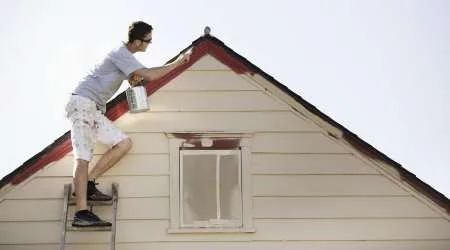
First homebuyer e-course
Sign up for our FREE 8-week course to get on the property ladder.
Most home loans are available for first-time buyers and existing borrowers who want to refinance or buy a second home. There aren't many loans that are only offered to first home buyers.
All of the loans in the table above are suitable first home buyers because:
See more of our monthly best home loan selections.
First home buyers, like all other borrowers, are trying to get approved for a home loan that suits their needs, without paying more than they need to.
Here's how to find the best loan for you:
Before you can get your first home loan or even try to buy a home, you need to know how much it will all cost you. Your deposit is usually the biggest cost.
But there are many other costs to consider:
You can use a borrowing power calculator to get an estimate of how much a bank will lend you.
Enter your income (and your partner's income if making a joint application), plus the number of dependants and any debts you have. The calculator will estimate your expenses using a standard cost of living index.
You can also check out our guide on how to increase your maximum borrowing capacity.
Once you have a good understanding of your property buying costs and how much you can borrow, it's time to think about the deposit.
Loan to value ratio (LVR) is a fancy mortgage term for your deposit size in relation to your property's value. For example:
Having a 20% deposit means you can avoid paying LMI.

Max Phelps, founder of Golden Eggs and creator of the Five 2 Money Diet, says first home buyers also need to prepare themselves for the financial responsibilities that come with owning a home, which goes much further than just saving the deposit.
"How good are you at managing your expenses and building up savings? If you've gotten into bad spending habits and money feels a little out of control, imagine how much worse it would feel with a giant mortgage hanging over your head," Phelps says.
"People spend an average of 30% of their income on a mortgage, but to get ahead, you should plan to still save 20% of your income as well – this will set you apart in the long run."
For those who are considering asking their parents for help with a home loan deposit, Phelps is cautious.
"My advice to parents thinking about putting their property on the line for their kids would be to make sure the kids are good savers first," he says.
If your deposit is smaller than 20% of the property's value, your lender will charge you LMI. This can cost you thousands or tens of thousands on top of all your other expenses (although you can often borrow it alongside your loan amount).
LMI costs vary depending on your loan amount and deposit size. If your LVR is 85% (a 15% deposit) then your LMI will be less than if you have an LVR of 95% with a 5% deposit.
Here are some examples:
| Property price | Deposit | LMI |
|---|---|---|
| $600,000 | 10% ($60,000) | $11,772 |
| $500,000 | 5% ($30,000) | $22,788 |
| $700,000 | 10% ($70,000) | $14,912 |
| $700,000 | 5% ($35,000) | $30,676 |
| $900,000 | 10% ($90,000) | $20,379 |
| $900,000 | 5% ($45,000) | $39,355 |
The LMI amounts above are taken from Finder's LMI premium estimate calculator and are examples only.
First home buyers in Australia have access to a large (and sometimes confusing) range of state and federal grants, concessions and other schemes.
Eligibility for these programs depends on things like the property value, your location and whether it's newly built or already exists. Every state and territory has different rules and policies.
Some first-time buyers are eligible for a cash grant. These grants can run up to $10,000 or even more in some cases. To qualify, you often need to be purchasing a new or off-the-plan property, with a limit on the overall value of the property. These grants differ in every state and territory.
Check your eligibility with our state-by-state first home owner guide
Stamp duty is one of the biggest costs associated with buying a property. Luckily, many first-time buyers can avoid stamp duty completely or get a discount on this tax. In NSW, for example, first home buyers don't have to pay stamp duty on properties valued below $650,000, saving them up to $22,000.
Learn more about the stamp duty exemptions and concessions in each state and territory.
If you only have a 5% deposit saved and you're a first home buyer, you could be eligible for the First Home Guarantee. Under this federal scheme, eligible borrowers can borrow 95% of their property value with a 5% deposit and have the government guarantee the remaining 15% of the deposit, allowing them to avoid LMI costs.
Another federal scheme, the First Home Super Saver Scheme allows first home buyers to make extra payments into their superannuation and then withdraw them to use for a home deposit. This ends up saving you in tax while helping you build your deposit.
Up to 10,000 single parents (2,500 per year for 4 years) are eligible to buy a home with a deposit of just 2%, under the government's Family Home Guarantee, announced as part of the 2021 Federal Budget in May. This means for the purchase of a property worth $700,000, the homebuyer will need to save a deposit of just $14,000.
The Regional Home Guarantee lets you buy or build a new home in regional Australia with a 5% deposit while avoiding LMI costs.




The Regional First Home Buyer Guarantee lets low deposit borrowers buy or build in regional Australia while avoiding LMI costs.
The First Home Loan Deposit Scheme will let new buyers borrow 95% and avoid paying thousands in lenders mortgage insurance premiums.
Planning on buying your first home? Tips from the experts can help first home buyers save a deposit and get into your own home sooner than you think.
The First Home Super Saver Scheme explained.
If you’re a first home buyer in NSW, find out what government grants and concessions may be available to you if you’re an eligible purchaser.

Sign up for our FREE 8-week course to get on the property ladder.

Get a home loan with a low deposit.

Pay less for your home loan with a super-low interest rate.

Save on your investment loan with these hot offers.
If the Veda Score is 560-590 -Will the lenders reject the loan application?
A lender will review your credit score but it’s only one part of the home loan application. Lenders also consider your income, spending, and the size of the loan. However, you put yourself in a better position if you can improve your credit score by doing things like lowering your credit card limits, paying off any missed or late payments and challenging any errors on your credit report.
My parents have offered to help us in getting into the house market by being guarantors for my husband & I. Would this be possible if they still have a small mortgage to pay and currently on the pension & unemployment benefit?
It might be harder for them to act as guarantors but if the mortgage is small it might be possible. It really depends on the lender and its lending criteria.
Hi team,
My fiance and I are looking to go into partnership to buy a property with a family friend. The family friend has good borrowing capacity and will be getting a loan to buy the property, so the title will be in his name, but we are wondering if it is possible to enter into a vendor finance agreement with our family friend to buy a portion of the property while he is still paying off the loan to the bank?
Ideally, we would like to buy a portion of the property and also be on the title without having to subdivide. Is this possible?
We are also wondering if my fiance and I will qualify for the First Home Owners grant and the exception for stamp duty if we go into a vendor finance agreement? We do intend to build our first home.
Thank you!
Hi Bri,
Thanks for reaching out to Finder.
With regard to the option of entering into a vendor finance agreement, it would help you buy a property without having to apply for a bank loan, but there are some major risks involved, including the big risk of losing your home.
The same fees and taxes are payable with vendor finance as they would be with a standard home loan. So the amount of stamp duty payable will vary depending on which state you live in and the value of the property.
To sum it up, if you’re thinking of purchasing a property through vendor finance, you should seek a solicitor to run you through the process and legal considerations so that you may be guided accordingly.
Cheers,
Joanne
Hi, I was wondering if I buy an investment property, whether or not i can claim the fist
home buyers on my second home that I will live in? I live in Victoria.
Hi Joel!
Thanks for the comment.
These are the guidelines for those who wish to claim FHOG on an investment property in Victoria:
Victoria’s State Revenue Office is responsible for offering the $10,000 grant to applicants buying or building their first new home. To be eligible for the grant, you must not have:
– Received a First Home Owner Grant in Australia
– Owned a home in Australia, either jointly or separately, prior to 1 July 2000
– Occupied an Australian home in which either of you acquired a relevant interest on or after 1 July 2000 for at least six continuous months
So if you purchased your investment property on or after 1 July 2000 and you didn’t live in it for a period of six consecutive months, you may be eligible for the FHOG.
You may check the other eligibility criteria for more information.
Alternatively, you may also contact your local state revenue office for clarification.
Hope this helps.
Cheers,
Jonathan
What is the best search engine in the world?
Hi Kathey,
Thank you for your inquiry.
Unfortunately, we cannot recommend what is best for you. Our company finder.com.au is a financial comparison website and general information service designed to help consumers to make a better decision. Please note we do not represent any company we feature on our pages.
However, at the time of this writing, there are three major search engines on the web today. That would be Google, Yahoo, and Bing. I would recommend you check each of them and see which would best meet your needs and preference.
Regards,
Harold